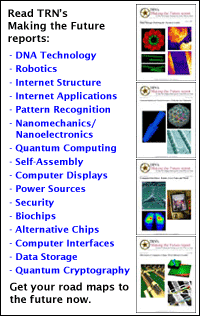
Neat
not always organized
By
Chhavi Sachdev,
Technology Research NewsHas paper overtaken your work space or can you actually see your desk top? And do you think that neatly filing papers means you are more efficient? You might be surprised.
Researchers at AT&T Labs looking into what kinds of paper documents people hoard, and why they do so, have found that efficiency and neatness don’t necessarily go hand in hand when it comes to filing versus piling. Their findings could point to better strategies of presenting and managing data on paper and online.
The researchers observed office workers in an industrial research environment as they moved to a new office. “We looked at people's paper archives in the context of an office move to see what they disposed of, what they kept and why they kept different paper documents,” said Steve Whittaker, a technology consultant at AT&T Labs. “We were particularly interested in why people kept personal copies of paper documents when many of these documents are publicly available or on the web,” he said.
The researchers started out with three hypotheses: that people would not have much paper at all, that if they did, it would mostly be unique documents that were not available digitally, and that those people who filed their papers would have smaller, more refined archives.
The results surprised the researchers. They found that 51 percent of all the paper stored was publicly available. They also found that filing and piling strategies were independent of job type.
The researchers predicted that during the office move people would clean out their archives and dump obsolete papers. Instead, people chose to keep 78 percent of their original archives.
People who filed their papers amassed larger archives than those who piled them, but they also accessed the information less frequently than pilers. In fact, “people who filed data didn’t necessarily find it easier to access that data than people who left it in large piles around their offices,” said Whittaker.
The reasons for these behavior patterns are both social and psychological. “People want personal copies of things for accessibility and security even when these are available on the Web,” said Whittaker. This explains why a majority of people’s paper archives are essentially print-outs of publicly posted material.
Paper is more accessible and mobile than digital information; people find it more convenient to read and carry around and besides, Web sites that are up today could vanish tomorrow, according to Whittaker. The study also found that people like to make notes in the margins of what they read, even though their annotations lose meaning over time.
The research suggests that filers are loath to throw away paper because the effort to sort, organize, and categorize their data is great. Pilers, on the other hand, do not invest so much time or effort and are likely to find it easier to discard information, said Whittaker. “Piling requires less effort than filing,” he said.
Pilers may also discard things they find irrelevant in the process of hunting for their information, while filers may tend to value tidiness more than efficiency by prematurely filing papers they could have discarded, Whittaker said. “Often filers will file information that later turns out to be irrelevant.” When the filers finally cast off paper, 23 percent of the material is thrown away unread, the study found.
“The results are important given the increased access to digital materials and the capability for storing vast amounts of data online,” said Whittaker. There is a need for digital paper that is mobile and can be written on as well as new, differently organized personal filing systems to reduce problems of premature filing, he said.
In general, it is important to learn how to move information between media efficiently, “rather than focusing on a simplistic, and erroneous substitution model that has often been implicit, if not explicit, in much technology research agendas,” said Liam Bannon, a professor of computer science and director of the Interaction Design Centre at the University of Limerick in Ireland.
This research confirms many of the beliefs people have about the utility of paper for different work activities by focusing on the importance of having personal paper records and how they work as reminders, Bannon said. “This study will add to the calls for more fine-grained analyses of people's everyday behaviors, and how these may help inform the design of more appropriate support technologies.”
Though practical digital paper is at least 5 years away, there may be improvements in digital filing systems in the next few years, said Whittaker.
Whittaker’s research colleague was Julia Hirschberg. They published the research in the June, 2001 issue of the journal Transactions on Computer Human Interaction. The research was funded by ATT Labs.
Timeline: <5 years
Funding: Corporate
TRN Categories: Human-Computer Interaction; Computers and Society
Story Type: News
Related Elements: Technical paper, "The Character, Value, and Management of Personal Paper Archives," in “ACM Transactions on Computer Human Interaction,” June, 2001.
Advertisements:
December 12, 2001
Page One
E-paper coming into view
Semiconductors control quantum spin
Cold electrons crystallize
Neat not always organized
Single molecule drives transistor
News:
Research News Roundup
Research Watch blog
Features:
View from the High Ground Q&A
How It Works
RSS Feeds:
News
Ad links:
Buy an ad link
| Advertisements:
|
 |
Ad links: Clear History
Buy an ad link
|
TRN
Newswire and Headline Feeds for Web sites
|
© Copyright Technology Research News, LLC 2000-2006. All rights reserved.